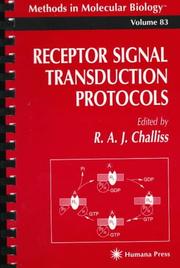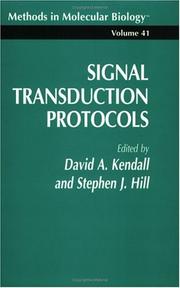| Listing 1 - 3 of 3 |
Sort by
|

ISBN: 0896034186 089603495X 1280836857 1592595677 9780896034181 Year: 1997 Volume: 83 Publisher: Totowa (N.J.) : Humana press,
Abstract | Keywords | Export | Availability | Bookmark
 Loading...
Loading...Choose an application
- Reference Manager
- EndNote
- RefWorks (Direct export to RefWorks)
R. A. J. Challiss assembles in Receptor Signal Transduction Protocols an outstanding collection of state-of-the-art methods from leading experts for interrogating ligand-receptor and receptor-effector interactions. These powerful methods emphasize the regulation of G-protein-coupled receptors and focus on receptor characterization, methods for investigating how receptors couple to G-proteins, and approaches to studying how receptor expression and function is regulated. Designed to be easily reproducible, the protocols offered include chimeric receptor construction, antibody generation, transient and stable transfection methods, in situ hybridization, as well as immunocytochemistry, functional assays of G-protein function, antisense methods for defining receptor-effector coupling pathways, and many more. Receptor Signal Transduction Protocols blends authoritative descriptions and applications of well-established methodologies with many novel techniques at the cutting edge of signal transduction research. The coverage cuts across disciplines and allows those already well-versed in one area to expand their repertoire of potent methods and broaden their research horizons. Every researcher interested in signal transduction today will find this richly practical guide indispensable.
Cellular signal transduction --- Cell receptors --- Research --- Methodology --- Physiology --- Signal Transduction --- Biochemical Processes --- Cell Physiological Processes --- Biological Science Disciplines --- Cell Physiological Phenomena --- Natural Science Disciplines --- Biochemical Phenomena --- Chemical Processes --- Disciplines and Occupations --- Chemical Phenomena --- Phenomena and Processes --- Cytology --- Biology --- Health & Biological Sciences --- Methodology. --- physiology. --- Medicine. --- Neurosciences. --- Biomedicine. --- Neural sciences --- Neurological sciences --- Neuroscience --- Medical sciences --- Nervous system --- Clinical sciences --- Medical profession --- Human biology --- Life sciences --- Pathology --- Physicians --- Cellular signal transduction - Research - Methodology --- Cell receptors - Research - Methodology
Book
ISBN: 0123918626 0123918731 Year: 2013 Publisher: San Diego, Calif. : Elsevier,
Abstract | Keywords | Export | Availability | Bookmark
 Loading...
Loading...Choose an application
- Reference Manager
- EndNote
- RefWorks (Direct export to RefWorks)
This new volume of Methods in Enzymology continues the legacy of this premier serial by containing quality chapters authored by leaders in the field. This volume covers G protein coupled receptors and includes chapters on such topics as G protein-coupled receptor trafficking motifs, structure-based virtual screening, and automation-friendly high throughput assays for identification of pharmacoperone drugs.Continues the legacy of this premier serial with quality chapters authored by leaders in the field Covers G protein coupled receptorsContains chapters
Cell receptors -- Research -- Methodology. --- Cellular signal transduction -- Research -- Methodology. --- G proteins -- Receptors. --- Signal transduction -- Physiology -- Laboratory manuals. --- Metabolism --- Biological Transport --- Receptors, Cell Surface --- Biochemical Processes --- Membrane Proteins --- Biochemical Phenomena --- Chemical Processes --- Metabolic Phenomena --- Phenomena and Processes --- Chemical Phenomena --- Proteins --- Amino Acids, Peptides, and Proteins --- Chemicals and Drugs --- Receptors, G-Protein-Coupled --- Protein Transport --- Protein Binding --- Human Anatomy & Physiology --- Health & Biological Sciences --- Animal Biochemistry --- G proteins --- Receptors. --- GTP-binding proteins --- GTP regulatory proteins --- Guanine nucleotide-binding proteins --- Guanine nucleotide regulatory proteins --- Membrane proteins --- Enzymology.

ISBN: 0896032981 9786610836505 1280836504 1592595286 9780896032989 Year: 1995 Volume: 41 Publisher: Totowa (N.J.) : Humana press,
Abstract | Keywords | Export | Availability | Bookmark
 Loading...
Loading...Choose an application
- Reference Manager
- EndNote
- RefWorks (Direct export to RefWorks)
As our understanding of the biological sciences expands, the boundaries between traditional disciplines tend to blur at the edges. Physiologists and pharmacologists, for instance, now need to embrace techniques that until recently were the strict preserves of biochemists and molecular biologists. However, the acquisition of new technologies can be a time-consuming and frustrating business, and unless an expert is on hand to give instruction, precious hours can be spent poring over half-described Methods sections with no guarantee of eventual success. The aim of Signal Transduction Protocols has been to get experts with "hands-on" experience in particular techniques to give detailed accounts of experimental protocols in a recipe-type format, which we hope will circumvent the problems of ambiguity often encountered when reading the literature. The techniques described in Signal Transduction Protocols are those that we think will be most useful in addressing questions in the area of receptor-mediated cell signaling, with particular regard to those receptors that are part of the G-protein-linked superfamily. To keep it to a manageable size, we have omitted any reference to electrophysiology and have instead concentrated on more biochemical approaches.
Molecular biology --- Cellular signal transduction --- Cell receptors --- G proteins --- Research --- Methodology --- 577.2 --- 547 --- -Cellular signal transduction --- -G proteins --- -#WDIR:vfm2 --- GTP-binding proteins --- GTP regulatory proteins --- Guanine nucleotide-binding proteins --- Guanine nucleotide regulatory proteins --- Membrane proteins --- Cellular information transduction --- Information transduction, Cellular --- Signal transduction, Cellular --- Bioenergetics --- Cellular control mechanisms --- Information theory in biology --- Cell membrane receptors --- Cell surface receptors --- Receptors, Cell --- Binding sites (Biochemistry) --- Cell membranes --- Proteins --- Molecular bases of life. Molecular biology --- Organic chemistry --- -Methodology --- Methodology. --- 547 Organic chemistry --- 577.2 Molecular bases of life. Molecular biology --- #WDIR:vfm2 --- Research&delete& --- Proteids --- Biomolecules --- Polypeptides --- Proteomics --- Cytology. --- Cell Biology. --- Cell biology --- Cellular biology --- Biology --- Cells --- Cytologists --- Cellular signal transduction - Research - Methodology --- Cell receptors - Research - Methodology --- G proteins - Research - Methodology
| Listing 1 - 3 of 3 |
Sort by
|

 Search
Search Feedback
Feedback About UniCat
About UniCat  Help
Help News
News